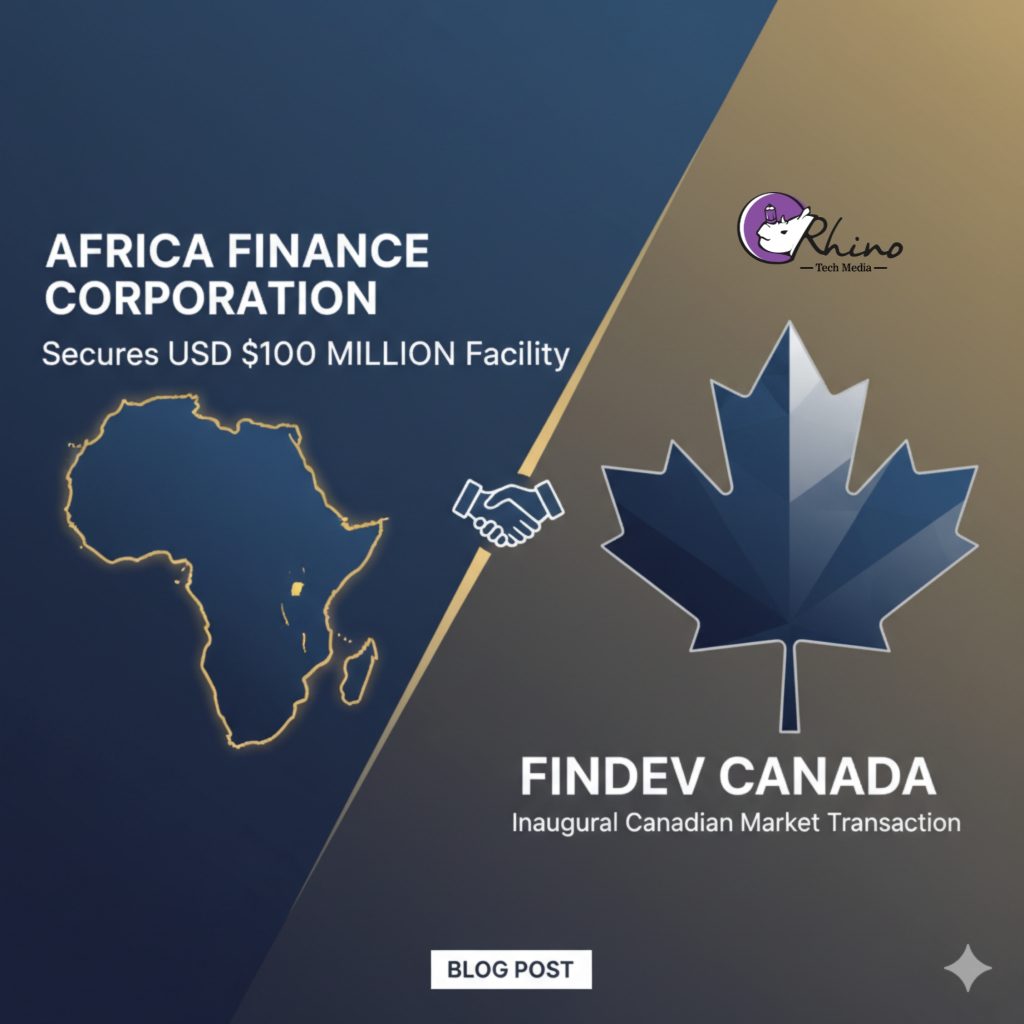Introduction
In October 2025, Africa’s infrastructure financing landscape witnessed a significant milestone when AFC secured a USD 100 million, ten-year term loan facility from FinDev Canada. This transaction is notable not only for its size and tenor, but because it marks AFC’s first engagement in the Canadian market and FinDev Canada’s inaugural infrastructure financing in Sub-Saharan Africa. The deal carries important implications for both institutions—as well as for the broader agenda of sustainable infrastructure development across Africa.
Background on the Institutions
AFC is a pan-African infrastructure solutions provider, established in 2007, with a mandate to catalyse infrastructure and industrial investments across the continent. It operates across multiple sectors—energy, transport, industrial development—and has a track record of deploying de-risked capital into transformational projects. Meanwhile, FinDev Canada is the Canadian bilateral development finance institution (DFI). Its mission is to mobilise private-sector investment in emerging markets and developing economies, aligning with the Sustainable Development Goals (SDGs) and the Paris Agreement.
The intersection of AFC’s African infrastructure reach with FinDev Canada’s ambition to expand its footprint in emerging markets set the stage for this collaboration.
The Deal: Key Features
The principal features of the facility are as follows:
- A USD 100 million term loan facility.
- Tenor of 10 years.
- Origin: FinDev Canada (Canada’s bilateral DFI) extending this facility to AFC.
- Significance: This is AFC’s first transaction in the Canadian market; and also FinDev Canada’s first infrastructure financing in Sub-Saharan Africa.
- Purpose: To bolster AFC’s long-term funding capacity and support a pipeline of renewable energy and low-carbon transport projects across Sub-Saharan Africa.
Objectives and Strategic Rationale
From AFC’s perspective, the facility serves multiple strategic objectives:
- Diversification of funding base: By engaging a Canadian DFI, AFC expands its funding partners beyond its traditional sources, thereby strengthening its liquidity and flexibility.
- Backing for climate-resilient infrastructure: The funds are earmarked to support renewable energy and low-carbon transport infrastructure—key sectors in AFC’s strategy for sustainable infrastructure.
- Signalling investor confidence: The transaction underscores investor confidence in AFC’s governance, execution capabilities and credit profile, thus reinforcing its role as a gateway for long-term sustainable capital into African infrastructure.
From FinDev Canada’s point of view:
- Market expansion: This deal represents a strategic entry into the African infrastructure sector, enabling FinDev Canada to broaden its geographical footprint and impact.
- Alignment with development goals: Investing via AFC aligns with FinDev Canada’s mission of mobilising private-sector finance, supporting sustainable development, climate action and inclusive growth in emerging markets.
- Partnership leverage: By partnering with an established African institution like AFC, FinDev Canada benefits from AFC’s local expertise, reach and project pipeline, thereby de-risking its exposure while scaling impact.
Impact and Implications
The transaction carries several important implications.
- For African infrastructure financing: The deal further validates Africa as a viable destination for long-term infrastructure capital from non-traditional sources. The involvement of a Canadian DFI signals that capital from North America is increasingly willing to engage Africa’s infrastructure sector.
- For climate-focused investment: By directing resources towards renewable energy and low-carbon transport, the facility contributes to decarbonisation efforts in Sub-Saharan Africa and supports the broader transition agenda. As noted, roughly 565 million people in Sub-Saharan Africa lack access to electricity; infrastructure investments like these are critical.
- For institutional positioning: AFC enhances its reputation and credibility by adding another diversified funding partner; FinDev Canada likewise strengthens its profile as a development finance actor willing to engage infrastructure in Africa.
- For market signalling: The transaction may catalyse further engagements between Canadian (and other North American) DFIs or commercial investors and African infrastructure platforms, thereby mobilising additional capital flows into the continent.
Challenges and Considerations
While the transaction is positive, several considerations warrant attention:
- Execution risk: The success of the facility hinges on AFC deploying the funds effectively into projects that realise the intended climate and infrastructure outcomes. Implementation risk in infrastructure remains significant in many African countries.
- Currency and macro risk: Infrastructure investments in Africa often face currency volatility and macroeconomic instability, factors that need to be managed carefully over the ten-year duration.
- Sustainability and impact measurement: With the deal explicitly geared to climate and low-carbon transport projects, robust frameworks for monitoring, reporting and verifying impact will be critical to ensure the desired outcomes.
- Financing ecosystem dynamics: While this transaction expands funding sources, infrastructure financing in Africa remains constrained; scaling such deals will require coordination across DFIs, commercial banks, institutional investors and local governments.
Conclusion
The USD 100 million, ten-year term loan facility between AFC and FinDev Canada marks a noteworthy milestone in the evolution of African infrastructure finance. It represents both a strategic win for AFC in diversifying its funding sources and a deliberate step by FinDev Canada into the African climate-infrastructure space. The transaction aligns with broader global goals of sustainable development and climate action, and fosters confidence that institutional capital can be mobilised for Africa’s infrastructure gaps.
However, translating potential into delivered impact will require strong execution, risk management and sustained collaboration. If successful, the deal could serve as a precedent and catalyst for more such cross-continental partnerships underpinning Africa’s infrastructure transformation.

